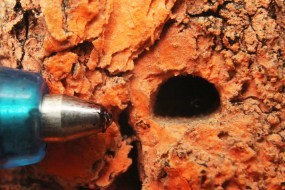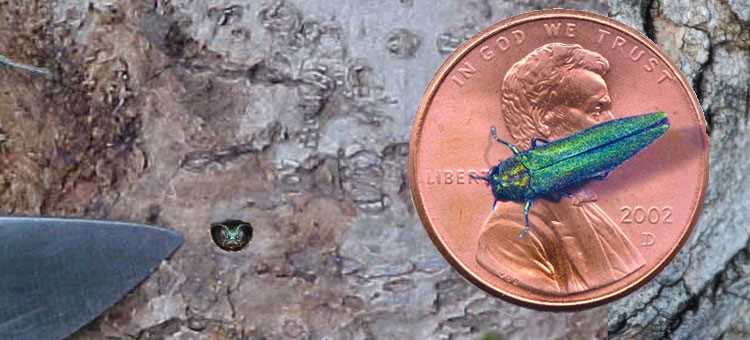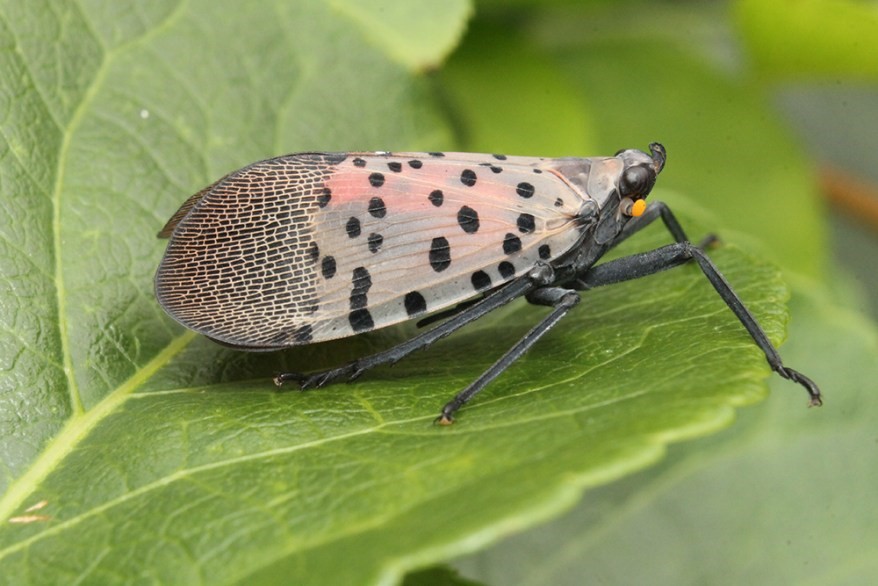 Protecting Our National Health, Food Supply, and Environment
Protecting Our National Health, Food Supply, and Environment
August 20-22, Southeastern Pennsylvania
Accidentally introduced species often become invasive in new environments, and develop into important pests of agriculture, the environment, and human health. Jared Diamond, in his book Collapse, recognizes invasive species as among the leading causes of collapse of societies in human history. Insects are among the world’s most significant invasive species, and cause substantial economic and societal impacts. Invasive insects can threaten entire agricultural industries and may jeopardize staple crops. Annually, insect pests inflict losses of over US$1.3 trillion worldwide by direct physical damage to crops or transmitting plant pathogens. Agricultural export markets can be restricted by insect pests. Native species are often impacted by invasive insects, which may also vector human diseases. Management responses to newly detected adventive species typically start with efforts at eradication, but these efforts are seldom effectual. Management of newly established insect pests can include implementation of quarantine areas, use of pesticides, biological control, and in some cases, post-harvest treatment of potentially infested produce.
 In August, 47 people from 20 different states, plus the District of Columbia and Canada, saw spotted lanternfly (Lycorma delicatula) for the first time in the field and learned of the damage caused by this new invasive pest, as well as other invasive insects such as the emerald ash borer, Asian longhorned beetle, brown marmorated stink bug, and balsam woolly adelgid. This group was gathered for the Entomological Society of America Plant-Insect Ecosystem Section’s Science Policy Field Tour, “Invasive Species Security: Protecting Our National Health, Food Supply, and Environment,” and the diverse audience of stakeholders included representatives from 16 different universities, 10 government agencies, six nongovernmental organizations, and three industry companies.
In August, 47 people from 20 different states, plus the District of Columbia and Canada, saw spotted lanternfly (Lycorma delicatula) for the first time in the field and learned of the damage caused by this new invasive pest, as well as other invasive insects such as the emerald ash borer, Asian longhorned beetle, brown marmorated stink bug, and balsam woolly adelgid. This group was gathered for the Entomological Society of America Plant-Insect Ecosystem Section’s Science Policy Field Tour, “Invasive Species Security: Protecting Our National Health, Food Supply, and Environment,” and the diverse audience of stakeholders included representatives from 16 different universities, 10 government agencies, six nongovernmental organizations, and three industry companies.
The 2.5-day tour covered a lot of ground, visiting the spotted lanternfly (SLF) quarantine zone in Berks County, Pennsylvania; several affected orchards, vineyards, and hardwood and fir stands; the Port of Philadelphia (the largest port on the East Coast for fresh produce imported from around the world); and a behind-the-scenes tour of the oldest insect collection in the United States at the Drexel University Academy of Natural Sciences in Philadelphia, founded in 1812.
Scientists from Penn State University described ongoing research programs for SLF, as well as management programs for other invasive species. Pennsylvania Department of Agriculture scientists described SLF quarantine and containment programs. Local farmers at Cherry Hill Orchard (Lancaster), Beekman Orchards and Vineyards (Boyertown), and Manatawny Creek Vineyard (Douglassville) provided descriptions and first-hand demonstrations of catastrophic losses from SLF. A stop at a popular urban park, “The Pagoda,” in Reading, demonstrated the impact of SLF in more urban settings. And a stand of hardwoods and firs in Oley provided a close-up look at the impact of emerald ash borer, Asian longhorned beetle, and balsam woolly adelgid.
 Outcomes:
Outcomes:
- Build awareness of the problem
- Build a stakeholder base
- Importance of area-wide monitoring and IPM programs
- Importance of entomological collections
Next steps:
- Use more events like this to educate and encourage advocacy on the issue of invasive species.
- Plan similar tours for other parts of the country (e.g. Florida)
The discussions and learnings from this science policy tour—some of which were captured and shared on Twitter via the hashtag “#invasivespeciestour“—will be continued at the Grand Challenges Summit, “Addressing the North American and Pacific Rim Invasive Insect and Arthropod Species Challenge,” November 9-10, in Vancouver, Canada.
Heartfelt thanks go out to all the growers and scientists who contributed to field demonstrations on this tour:
- Growers: Tom Hass, Cherry Hill Orchards; Calvin Beekman, Beekman Orchards and Vineyards; Darvin Levengood, Manatawny Creek Vineyard
- Penn State Scientists: Hillary Peterson, Greg Krawczyk, Julie Urban, Charlie Mason, Erica Smyers, Robyn Underwood
- Tracy Leskey, USDA-Agricultural Research Service
- John Baker, USDA-Animal and Plant Health Inspection Service (APHIS)
- Lawrence Barringer, Pennsylvania Department of Agriculture
- Port of Philadelphia: Bill Spence, APHIS Plant Protection and Quarantine; Todd Edelscien, U.S. Customs and Border Protection
- Jason Weintraub and Greg Cowper, Philadelphia Academy of Natural Sciences

Tour Stakeholders
- Universities (16)
- Pennsylvania State University
- University of Georgia
- University of Minnesota
- North Carolina State University
- Ferrum College
- University of Kentucky
- Virginia Tech University
- Auburn University
- Washington State University
- Louisiana State University
- Michigan State University
- University of Maryland
- University of Hawaii at Manoa
- Georgia Southern University
- University of California San Diego
- Utah State University
- State and National Governmental Agencies (10)

- US Department of Homeland Security
- US Department of Defense
- US Department of Agriculture Agric Res Service
- USDA National Institute of Food and Agric
- USDA Animal and Plant Health Insp Serv
- US Department of the Interior
- Canadian Food Inspection Agency
- Hawaii Department of Agriculture
- California Cooperative Extension
- Idaho State Department of Agriculture
- Non-Governmental Organizations, Non Profits, Private Industry (9)
- National Association of County and City Health Officials
- National Wood Pallet and Container Manufacturers Asso.
- Center for Invasive Species Prevention
- Cary Institute of Ecosystem Studies
- Longwood Gardens
- Entomological Society of America
- US Citrus, LLC
- Entoniche Consulting, LLC
- Corteva Agriscience
